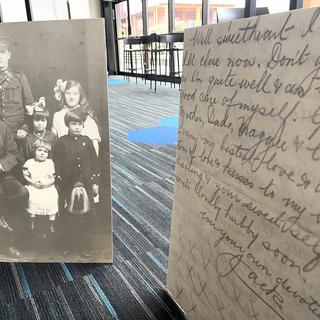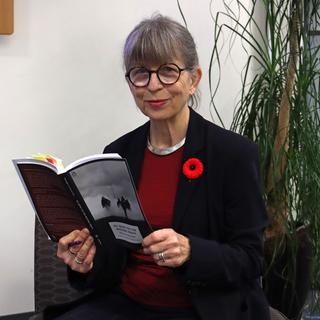VIU researchers are mapping historical data contained in the Canadian Letters and Images Project and creating a sophisticated interface so scholars, students and the public can gain better access to information contained in the archive.
Researchers at Vancouver Island University’s (VIU’s) MeTA Digital Humanities Lab are using advanced computer software to help map large quantities of historical data contained in The Canadian Letters and Images Project so users can find information more easily.
The Canadian Letters and Images Project is an online archive of the Canadian war experiences, from all periods of Canada’s past, and contains letters, diaries, photographs and other related materials. The collection offers insight into the lives of ordinary individuals during wartime.
The archive could also contain other valuable information that would give researchers insight into historical perspectives on gender issues, health care and more, but finding that information in the vast collection is challenging. Currently users can only search the database by using simple keyword searches or by examining one letter or piece of material at a time on the website.
Dr. Richard Lane, Director of VIU’s MeTA Digital Humanities Lab; Dr. Whitney Wood, Canada Research Chair in Historical Dimensions of Women’s Health; and Dr. Stephen Davies, Director of the Canadian Letters and Images Project, are working together to develop a better user interface for the archive. The project uses advanced software to map the vast amounts of data in the collection to gain a better understanding of the information in the online archive.
“Using digital humanities software, we are bringing together exciting new advances in literary and historical studies to enhance a nationally and internationally significant online archive,” says Lane.
Lane, Wood and Davies received $149,895 from the Canada Foundation for Innovation and the BC Knowledge Development Fund for their project, Macroanalysis/Big Data Machine Reading Tools and Microanalysis/Digital Text Analysis Tools for Open Access Research.
The MeTA Digital Humanities Lab is using machine reading tools in this project, to annotate and map large quantities of data. The Lab is also using other software that can analyze the Canadian letters in ways that reveal new relationships, connections and ideas that function across the collection as a whole. For example, Wood hopes to use the newly analyzed CLIP data to explore gendered experiences of health care, illness and injury at the First World War battlefront.
-30-
MEDIA CONTACT:
Rachel Stern, Communications Officer, Vancouver Island University
C: 250.618.0373 l E: Rachel.Stern@viu.ca | T: @VIUNews





